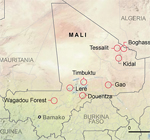Mali thrust seen raising terror risk
French expert fears jihad’s new allure
Sunday, February 24, 2013
PARIS — The French military intervention in Mali has increased the threat of domestic terrorism, with some French citizens of black African ancestry becoming more willing to fight under the banner of jihad, according to France’s most prominent investigative judge dealing with terrorism.
The concerns of the French authorities were once largely limited to residents of North African Arab ancestry, such as Algerians and Tunisians, but attention has broadened to include those French with roots in Mali, Senegal, Nigeria and Niger, the judge, Marc Trevidic, said in an interview.
At the same time, since a Frenchman of Algerian ancestry, Mohamed Merah, 23, killed seven people last March in Toulouse, the French police and intelligence agencies have been opening more investigations but have not been given more investigators, and also have become less willing to monitor terrorism suspects for longer periods of time before intervening and detaining them, Trevidic said.
“After Merah,” who said he had been recruited into al-Qaida, “the French are afraid of terrorism,” he said. “They are afraid that you can have one or two or three Mohamed Merahs. And they could be right; no one really knows.”
Trevidic, 47, has been dealing with terrorist cases since 2000, before al-Qaida’s attacks in the United States, and he is perhaps the best-known of the eight investigating magistrates assigned to a special anti-terrorism court in Paris. When he started, he said, terrorism was simpler - “there were no women, no children and few groups.”
Now, “the field of suspects is much larger, so the situation gives me a little fear,” he said. “We’re fighting groups that are less powerful and organized than before, but which are much more difficult to detect.”
The Mali intervention has raised the stakes, he said, at home and abroad, where French tourists and workers are more vulnerable to kidnapping. When France said several months ago that it would intervene in Mali, with the help of African forces, “at that moment young Muslimsin France heard that Shariah is in force in northern Mali and they wanted to go there to defend this ‘real Islam’ against an announced intervention,” he said.
The authorities began to notice an increase in the number of French passport holders departing for Mali. Trevidic is now dealing with the case of four Frenchmen, at least two of whom are in Mali, he said, who are believed to be fighting alongside the Islamists. As the intervention continues, he said, “now the main problem is to try to stop the departures, because if we can’t, the threat will be higher and higher.”
The suspects are also younger, he said, and angrier.
“The young Muslims I see in my office have developed a kind of paranoia,” he said. “They are sure that we want to fight Islam, that we’re against Islam. They were born in France and were not practicing Muslims, but now they pray and they are sure we are against Muslims.”
Part of the problem, he said, is the lack of religious education in public schools, which are secular and rarely provide comparative religion courses.
“So no one tells them about their own story, their own origins,” he said. “They have only what they can pick up themselves on the Internet or from some friends, and where there is no foundation, you can go to extremism very quickly.”
For now, “the danger is not so big, perhaps, but the threat is big,” he said. “This is the way terrorists win - they can win with very little.”
Meanwhile, the Chadian army said that its troops killed65 Islamic extremist rebels and destroyed five vehicles in fierce fighting in northern Mali
The Chadian military said in a statement Saturday on state broadcasting that 13 Chadian soldiers also were killed and six were wounded in the fighting Friday in northern Mali.
Information for this article was contributed by The Associated Press.
Front Section, Pages 7 on 02/24/2013
